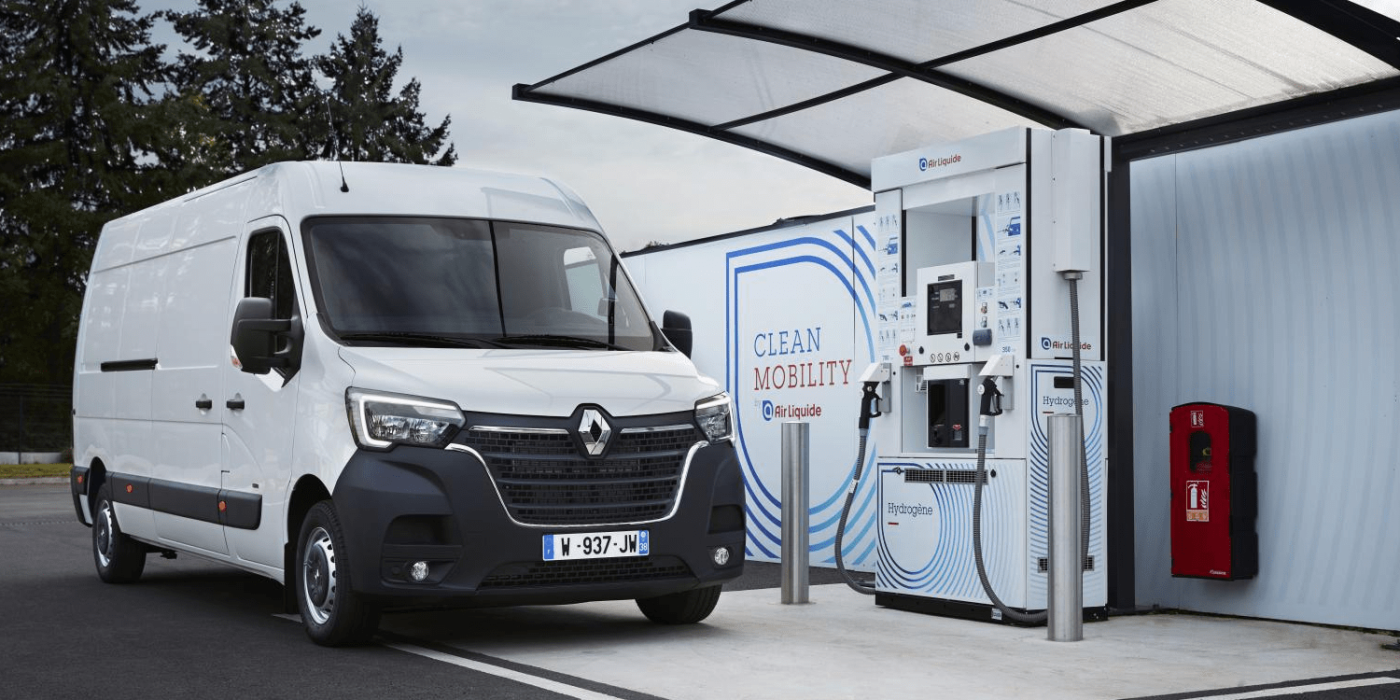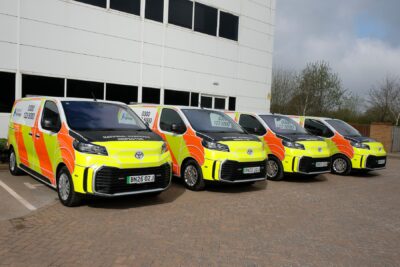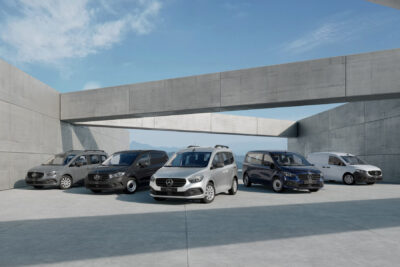Renault & Plug Power target European market for H2 light commercial vehicles
Renault and fuel cell specialist Plug Power plan to establish a 50:50 joint venture in France by mid-2021. They target a share of more than 30 per cent of the fuel cell-powered light commercial vehicle (LCV) market in Europe.
++ This article has been updated. Kindly continue reading below. ++
The two companies have signed a memorandum of understanding (MoU) to establish the joint venture. Renault makes clear in an emailed statement we received that it intends to become the European market leader for fuel cell LCVs together with Plug Power. The company specialised in green-hydrogen fuel cell systems and is based in New York. The goal is to build innovation and manufacturing capacity in France for fuel cell systems and their integration into vehicles. Light commercial vehicles, along with cabs and FC-powered passenger vans, will be at the centre of a broader offering that will extend to the entire hydrogen ecosystem for refilling and fleet maintenance.
The future joint venture will have competencies in R&D, manufacturing and sales. In terms of R&D, Renault and Plug Power plan to establish an innovation centre to develop fuel cell technologies and vehicles based on existing and future Renault Group platforms. The French company says that the initial focus will be on the heavy van segment, based on the Trafic and Master vehicle platforms.
The joint venture aims to establish a vertically integrated manufacturing centre for fuel cell stacks and systems in France on the manufacturing front. Renault CEO Luca de Meo says that the joint venture project is fully in line with Renault’s strategy to provide fuel cell solutions for LCV. Renault announced in October 2019 that it was planning to bring the fuel cell to light commercial vehicles, although this was announced as a range extender. Along with hydrogen fuel cell vehicles, refuelling systems are also to be built locally.
Plug Power CEO Andy Marsh that the Plug Power can “combine our technology with their decades-long experience leading the European automotive market.” He expects these elements will make the joint venture a “market leader for fuel cell heavy-duty vans in Europe.”
In terms of sales, the partners envision offering a whole suite of solutions in addition to the vehicles. The two companies say that this partnership will create a hydrogen vehicle “eco-system solution company” that offers vehicles, hydrogen fueling stations, hydrogen fuel, and services to customers. The duo expects this approach to accelerate adoption by commercial fleets.
Renault CEO Luca de Meo explains that: “With this project, our ambition is to position France as a bridgehead of industrial, technical and commercial development in this key technology, and to strengthen our leadership in Europe as our objective is to become the European leader in fuel cell LCV.”
While the French company is looking to bring its strong position in (electric) LCVs in Europe to the partnership, Plug Power has 20 years of fuel cell and hydrogen technology experience. The American company says it has installed more than 40,000 fuel cell systems to date and developed and built 110 refuelling stations. Plug Power is known as an advocate and technology leader for green hydrogen solutions based on electrolysis.
The JV is expected to begin launching fuel cell-powered light commercial vehicles in Europe this year as part of pilot fleets. The joint venture will be provided with the necessary resources by Renault and Plug Power to achieve the joint venture’s goals. So far no indication has been given on what kind of fiscal scale this venture will operate. Although the plan is to kick off soon, the partners still need to get the green light from unions and the relevant competition authorities.
Also in France, Plug Power has recently begun cooperating with Gaussin, a manufacturer of specialised vehicles. Globally too, the company is also putting out feelers in other regions of the world. A few days ago, the South Korean SK Group invested 1.5 billion U.S. dollars in Plug Power, acquiring just under ten per cent of the shares in the US specialist. SK Group and Plug Power are also planning to set up a joint venture in South Korea by 2022 to provide fuel cell systems, hydrogen filling stations and electrolysers for the fast-growing Asian market.
In terms of market-ready players with similar approaches, the fleet and hydrogen refuelling ecosystem approach was first trialled on the European continent by Hyundai with its Xcent trucks in Switzerland. More recently, Toyota launched a business unit for hydrogen fuel cell activities for commercial vehicles and refuelling ecosystems in Europe.
In Europe, the climate for rapid action on green hydrogen eco-systems is favourable with several governmental and industrial initiatives recently backing the hydrogen economy. In summer 2020, the European Commission adopted the EU strategy for Energy System Integration and Hydrogen with a specific focus on commercial vehicles and hydrogen infrastructure. In December 2020, twenty-two EU member states and Norway have signed a declaration of intent stating their willingness to support the development of a European value chain for green hydrogen in particular and to invest billions of euros accordingly.
Update 04 June 2021: Renault Group and Plug Power have now launched their fuel cell light commercial vehicle joint venture in Europe, announced in January. The company, which is owned equally by both partners, is called Hyvia and is headed by David Holderbach. Hyvia is composed of “Hy” for hydrogen and “Via” for way or road.
Hyvia’s activities will be carried out at existing Renault sites in France. The joint venture’s headquarters and product development will be located in Villiers-Saint-Frédéric, Renault Group’s light commercial vehicle research and development centre, to maximise synergies between the teams. The process, manufacturing and logistics teams will be based in Flins as part of the Re-Factory project and plan to start assembling fuel cells and charging stations by the end of 2021. The first Renault Master-based vehicles will be assembled at the Batilly plant. Fuel cell integration will be handled by PVI, a subsidiary of Renault Group based in Gretz-Armainvilliers since 2017.
There is also an update on the timeline for the planned vehicles: The first three fuel cell vehicles that Hyvia plans to launch should be available in Europe by the end of 2021. As mentioned, the vehicles will be based on the Renault Master platform. A van and a chassis cab version are planned for freight transport, as well as a city bus version for passenger transport. Ranges of 500 kilometres and a refuelling time of three minutes are announced.
Source: via email, plugpower.com, renault.com, renaultgroup.com (update)





0 Comments